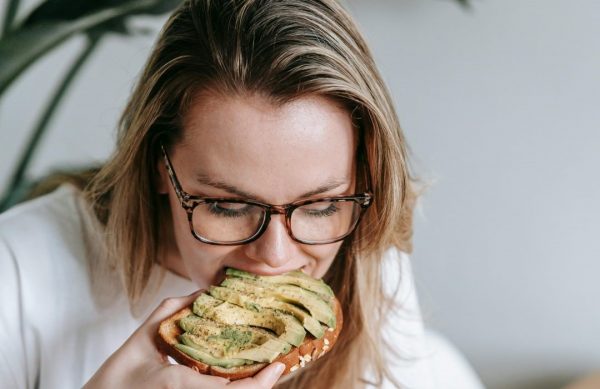People spend a lot of time thinking about food, cooking food and eating food. But they very seldom put very much emphasis on chewing their food.
Just think about how long it takes to create perfectly smoked baby-back ribs or beef brisket for summer holidays.
Nearly all day, right?
But how soon is it over once you sit down to eat? Pretty quickly, right?
We love to wolf down our food!
That’s a shame, because the longer we chew our food, the better it tastes. You see, when food lingers in your mouth, the aroma of the food is carried from the back of your throat into your nasal cavity. And oddly enough, this “retronasal smell” phenomenon enhances the flavor of the food.
So if you are going to take the time to make a great meal, why not take the time to chew it slowly and savor the flavors when you sit down to eat?
This is just one of the reasons I chew my food 20 to 30 times before I swallow.
Good Digestion Begins in Your Mouth
You may not realize it, but your mouth is actually part of your digestive system.
It’s true!
Most people think the only reason we chew is to break food down small enough that we don’t choke on it. But the longer food stays in your mouth, the more time it is exposed to saliva, which is actually a digestive juice.
Saliva contains an enzyme called lingual lipase, which breaks down fats for digestion. It also contains amylase, which breaks down carbohydrates so they can be digested. If foods aren’t exposed to these enzymes while you’re chewing, your stomach will have a heck of a time trying to process them.
This explains why people who gulp down their food often end up with digestive complaints. Some get bloated. Others have indigestion and acid reflux. Most of them can’t poop because they’re constipated.
At the same time, when food particles are broken down into smaller particles, it’s easier for your body to absorb the nutrients in them – the proteins, vitamins, minerals and healthy fats.
And one of the biggest benefits of chewing your food more thoroughly is that it could help you lose weight.
A while back I made note of a study published in Obesity, which found that chewing longer increases the body’s ability to burn fat. It showed that people burned an extra 10 extra calories when eating a 300-calorie meal when they chewed their food until there weren’t any lumps left in it. In other words, slow chewers burn more calories!
That might not sound like much. But when you consider three meals a day over the course of a month, it would amount to burning around 1,000 extra calories each month. That’s a lot!
Plus, we know that when people chew their food longer, the stomach sends signals to shut down the “I’m hungry” signal sooner than it does when food is wolfed down. So it helps you feel full faster and reduces food intake.
Take the Slow Chewer Challenge
Back in 2009, a group of health officials in Japan advocated starting a “30 Chews” media campaign to the public. The idea was that chewing more deliberately would help people enjoy the flavor of their food, make digestion easier and help fight obesity.
I wholeheartedly agree! So here is my challenge to you.
When you sit down to your next meal, chew each bite 20 to 30 times. By the time you swallow, it should be the consistency of a smoothie.
If you need to find a way to slow yourself down, try setting your fork and knife on the table while you chew. After all, it’s hard to focus on chewing when you have the next bite of food already prepared to stuff into your mouth! Don’t pick your fork up again until you have fully chewed and swallowed the previous bite.
When you take your time to eat and stop scarfing your food down, it will taste better. It will digest better. You will poop better. You will have more after-meal energy.
You’ll probably even lose weight in the process.
SOURCES:
Taylor AJ. Volatile flavor release from foods during eating. Crit Rev Food Sci Nutr. 1996 Dec;36(8):765-84.
Shepherd GM. Smell images and the flavour system in the human brain. Nature. 2006 Nov 16;444(7117):316-21.
Hamada Y, Kashima H, Hayashi N. The number of chews and meal duration affect diet-induced thermogenesis and splanchnic circulation. Obesity (Silver Spring). 2014 May;22(5):E62-9.
Hamada Y, Hayashi N. Chewing increases postprandial diet-induced thermogenesis. Sci Rep. 2021 Dec 23;11(1):24483.
Miquel-Kergoat S, Azais-Braesco V, Burton-Freeman B, Hetherington MM. Effects of chewing on appetite, food intake and gut hormones: A systematic review and meta-analysis. Physiol Behav. 2015 Nov 1;151:88-96.
Zhu Y, Hollis JH. Increasing the number of chews before swallowing reduces meal size in normal-weight, overweight, and obese adults. J Acad Nutr Diet. 2014 Jun;114(6):926-931.
Japan gov’t: Chew food 30 times. UPI Health News. Oct 31, 2009.



